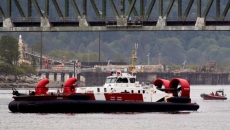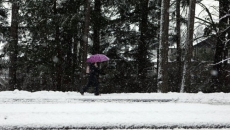Conservative Leader Pierre Poilievre is calling on the Liberals to exempt all forms of home heating from the carbon price, after Prime Minister Justin Trudeau announced an exemption for three years that only applies to home heating oil.
The federal government announced last week that it is increasing the carbon price rebate for rural Canadians and lifting the carbon price off home heating oil entirely for the next three years.
The carbon price is intended to make fossil fuels more expensive as an energy source, to encourage people to find cleaner alternatives.
But Trudeau said it had become clear that wasn’t happening when it came to heat pumps, in part because it takes time and money to make the switch.
We’re helping people save money by making it easier to switch to an electric heat pump, and away from home heating oil. On average, homeowners who make this switch save up to $2,500 per year on home energy bills – so it’s good news for both your wallet and our environment.
— Justin Trudeau (@JustinTrudeau) October 30, 2023
The changes to the carbon pricing regime come as affordability concerns leave the Liberal party flailing in the polls in Atlantic Canada.
Poilievre wrote a letter to Trudeau on Sunday urging the government to expand the exemption to all forms of home heating, including natural gas, which is more common in Western Canada.
"In pausing the tax on home heating oil until after the election, however, you plan to keep the tax on lower-emitting natural gas heat for which bills will be jumping even further in mere weeks as it gets colder," wrote Poilievre.
"That is why common sense Conservatives are offering our full co-operation to pass an emergency bill tomorrow to axe the carbon tax on all forms of heat before winter heat bills hit Canadians next month."
And yet more proof the PBO finds the carbon tax makes most people worse off. pic.twitter.com/yZPc3KJe5n
— Pierre Poilievre (@PierrePoilievre) October 30, 2023
In an interview with CTV News on the weekend, Rural Economic Development Minister Gudie Hutchings said the Liberals' Atlantic caucus pushed for the changes to home heating oil. Most of Atlantic Liberals MPs stood behind Trudeau as he made the announcement Oct. 26.
Hutchings suggested that perhaps Prairie provinces should elect more Liberals to push for exemptions that affect constituents in those provinces, prompting backlash, including from Alberta Premier Danielle Smith.
"Atlantic caucus was vocal with what they've heard from their constituents, and perhaps they need to elect more Liberals in the Prairies so that we can have that conversation as well," Hutchings said.
Following her comments, Smith accused the federal government of using the carbon price to punish people who didn't vote Liberal.
"You heard them. The carbon tax isn't about reducing emissions, it’s punishment for not voting Liberal. There are no words to describe how absurd and damaging this is to our Confederation," Smith posted on X, formerly known as Twitter.
Statistics Canada reports that in 2021, only three per cent of households nationally relied on home heating oil, while 44 per cent used natural gas and 40 per cent used electricity.
But the regional variation is large.
In Newfoundland and Labrador, almost one in five households use home heating oil, while it is two in five in Prince Edward Island, and one in three in Nova Scotia. In New Brunswick there is a sharp drop-off, with just one in about every 14 households using home heating oil.
In Quebec and Ontario, the share of households that use it falls further, to less than one in 20. West of Ontario, home heating oil is so uncommon that Statistics Canada said the numbers reported were too low to be reliable.
Natural gas is the opposite, with about four in five homes in Alberta and Saskatchewan reliant on it, along with one in three homes in Ontario, half in Manitoba and two in five in British Columbia.
But natural gas isn't used at all in Newfoundland or P.E.I., and less than one in 20 homes in Nova Scotia and New Brunswick use it.
Electricity is most common as a heat source in the hydro-rich provinces where rates have been cheapest, with about two in five homes in Manitoba and British Columbia using it, along with about one in three in Newfoundland and almost four in five in Quebec.
Electricity is the only heating source that grew in Canada between 2019 and 2021, going up from 40 per cent of homes across the country to 43 per cent.
From an emissions perspective, home heating oil produces about 42 per cent more greenhouse-gas emissions than natural gas to get the same amount of energy, according to data from the U.S. Environmental Protection Agency.






